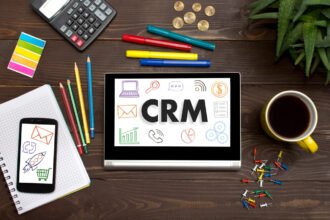
My idea of SSLAs (social service level agreements) would take the concept of the SLA and just apply it to the social web but hopefully in a much simpler way. I’m not stuck on the term here and perhaps SSLA might not even be the best term for this, maybe Terms of Social Customer Engagement (ToSCE) or Terms of Social Engagement (ToSE) makes more sense. I don’t want to get into a whole debate around this like we have been with term “Social CRM”. I realize that SSLA might sound scary and intimidating, managers might be weary of using it and I’m sure legal departments won’t be too thrilled with the term either, but as you will see below whatever you chose to call it is irrelevant. When reading below feel free to replace SSLA with your own acronym of choice. However, here is why I think SSLA makes sense:
Service level agreements aren’t new, they’ve been around for quite some time and virtually every company on the planet has it’s own SLA. According to Wikipedia:
“A service level agreement (frequently abbreviated as SLA) is a part of a service contract where the level of service is formally defined. In practice, the term SLA is sometimes …

My idea of SSLAs (social service level agreements) would take the concept of the SLA and just apply it to the social web but hopefully in a much simpler way. I’m not stuck on the term here and perhaps SSLA might not even be the best term for this, maybe Terms of Social Customer Engagement (ToSCE) or Terms of Social Engagement (ToSE) makes more sense. I don’t want to get into a whole debate around this like we have been with term “Social CRM”. I realize that SSLA might sound scary and intimidating, managers might be weary of using it and I’m sure legal departments won’t be too thrilled with the term either, but as you will see below whatever you chose to call it is irrelevant. When reading below feel free to replace SSLA with your own acronym of choice. However, here is why I think SSLA makes sense:
Service level agreements aren’t new, they’ve been around for quite some time and virtually every company on the planet has it’s own SLA. According to Wikipedia:
“A service level agreement (frequently abbreviated as SLA) is a part of a service contract where the level of service is formally defined. In practice, the term SLA is sometimes used to refer to the contracted delivery time (of the service) or performance. As an example, internet service providers will commonly include service level agreements within the terms of their contracts with customers to define the level(s) of service being sold in plain language terms. The SLA records a common understanding about services, priorities, responsibilities, guarantees, and warranties.”
I don’t think everything above is applicable to the SSLA definition, for example being a part of a service contract, but hopefully you understand where I’m trying to go with this.
Simply put a SSLA defines the relationship between a social customer and the company on a specific social channel. Both the company and the customer need to know, “what’s in it for me?”
Many companies have their own social media guidelines which dictate how customers should interact with the company, oftentimes these guidelines are found buried on the corporate site. SSLAs are more public facing and exist on every channel where a customer interacts with the company, hopefully in a short and easily understood format. The goal here is not to get “legal” or to confuse the customer but to help both the customer and the company understand how the relationship will work and evolve.
An SSLA should answer the following questions (at least, but more can be included when/where applicable and as the relationships evolve):
- What the social customer gets from the interaction, it is support, special offers and discounts, or all of the above (why should the customer be on that channel, what’s in it for them)?
- When does the company respond to the social customer (think hours of operation)?
- How long does it take the company to respond to the social customer (does the company respond to all interactions, does it take 30 mins for each response)?
- What does the company get from participating in that social channel and interacting with the social customer (this may also be just an internal piece)?
- What the company will and will not tolerate on each social channel (cursing, defamatory remarks, insults)
We know that companies are starting to increase their presence on social sites. The problem however is that the relationships or the terms of engagement are not defined on the channels that the companies participate on.
Companies can no longer afford to “float” around on various social sites, there needs to be some direction or guidance for both the company and the customer.
I’ll refer to a quote from Gartner which I use in my Social CRM presentations:
“By 2010 more than half of companies that have established an online community will fail to manage it as an agent of change, ultimately eroding customer value. Rushing into social computing initiatives without clearly defined benefits for both the company and the customer will be the biggest cause of failure.”
I had a major problem with American Airlines not too long ago where I was stuck at an airport. I was tweeting like a madman to have AA help me but I didn’t receive a single response until the next day. If I would have known that AA didn’t check their tweets at night or that it takes them at least 48 hours to respond then perhaps I would not have wasted my time tweeting with them to begin with. As a customer I made the assumption that since AA was participating in a “real-time” platform that their response to me would be…real time. The SSLA would serve as a way to help define the relationship between the social customer and the company on the specific channel that they are interacting with. What does a customer get or what should they expect by “liking” your facebook page? What does a customer get or what should they expect by following (or interacting with) your company on twitter? We’re not talking about some massive document but something simple that companies can put up on their various social presence’s that will help customers know why the company exists there and what type of service they can (and cannot) expect. Perhaps twitter serves as the customer service support platform for a company that handles all tweets between the hours of 9-6 and responds to all tweets within 15 mins. Maybe facebook acts as the Q&A section for longer more complex questions, promotions, and new/future product announcements (or where customers can help each other). Each platform a company uses needs to have a strategic objective behind it. It’s no longer good enough to amass fans or followers. The SSLA can be a part of something such as a twitter background, a profile bio, or a facebook fan page description.
I had a discussion about this with Prem Kumar about this and he made a very good point. Customers have done an excellent job of ignoring traditional SLAs and the reality is that customers oftentimes just don’t take the time to read and understand SLAs from every company they purchase from. While I do agree with Prem, I do believe that an SSLA will help define social relationships between customers and companies. Traditional SLAs are long and intensive, the purpose of an SSLA is to be a very simple and short description of what a customer can expect from a company in any particular social channel and the SSLAs will actually exist where the interactions take place (meaning they will be highly visible).
Do I think SSLAs are going to be perfect? Of course not, there is no perfect solution but at the end of the day your company has two choices: develop this public facing SSLA which I guarantee many of your customers will see, or don’t do anything and let your customers assume how the relationship will work. In my opinion the choice is obvious.
Would love to hear your thoughts on this, please share in the comments below.






